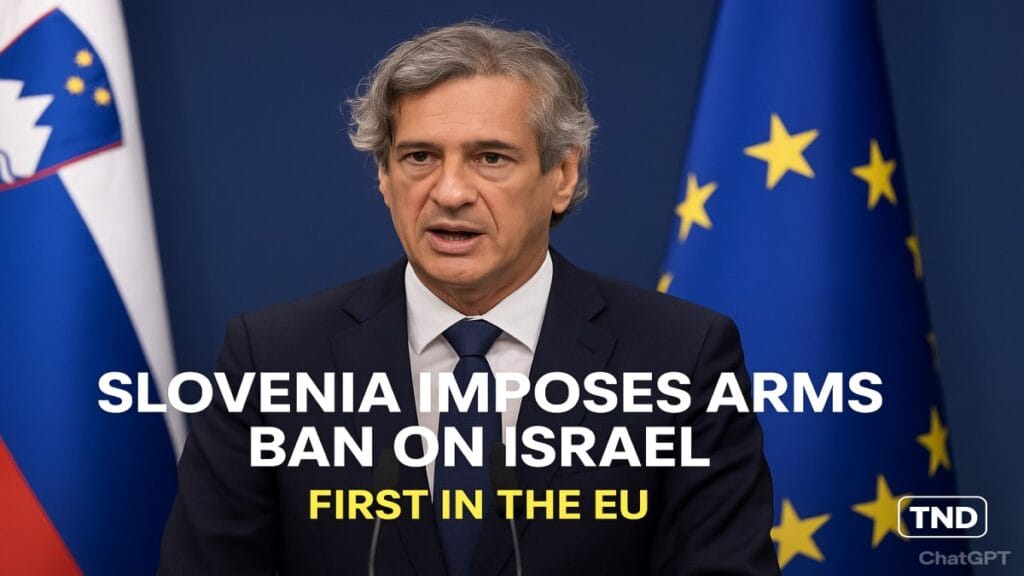
Slovenia – In a historic and bold move, Slovenia has become the first EU country to ban all weapons trade with Israel due to the ongoing war in Gaza. The decision, announced by Slovenian Prime Minister Robert Golob, marks a major geopolitical statement and highlights the growing rift within the European Union over its policy stance on the Israel-Gaza conflict.
The Slovenian government’s resolution comes amid increasing international pressure on Israel for its military operations in the Gaza Strip, which have resulted in significant civilian casualties and alleged violations of international humanitarian law.
Slovenia’s Groundbreaking Decision
At a press conference following a cabinet session on August 1, Prime Minister Robert Golob declared the complete suspension of military and dual use goods exports to Israel, stating unequivocally:
“Slovenia cannot remain silent or complicit while war crimes are committed. The European Union has failed to adopt unified measures, and that is why we are acting alone.”
The arms embargo includes the export, import, and transit of weapons, ammunition, and military technology. This move not only severs ongoing arms contracts but also halts any future dealings related to defense equipment between Slovenia and Israel.
This decision positions Slovenia at the forefront of European human rights diplomacy, sending a strong message to both Brussels and Tel Aviv about the moral weight it places on international law and the protection of civilian lives.
Israel’s War in Gaza
The current war in Gaza, now stretching into its 10th month, began with a major escalation between Israel and Hamas. Since then, Israeli Defense Forces (IDF) have conducted extensive operations across Gaza, resulting in tens of thousands of Palestinian deaths, including a large number of women and children.
Despite global calls for ceasefires and humanitarian access, Israel has continued its offensive, citing the destruction of Hamas military infrastructure as its priority. However, the scale of destruction, displacement, and civilian suffering has drawn criticism from the United Nations, human rights organizations, and numerous governments worldwide.
Slovenia’s ban on weapons trade with Israel comes as international scrutiny of Israeli actions increases, and legal experts begin to question whether Israel is in violation of the Geneva Conventions.
EU Divided on Gaza
The European Union has struggled to form a united stance on the Gaza war. While countries like Ireland, Spain, and Belgium have called for stronger actions and even recognition of Palestine, others like Germany, France, and the Czech Republic have taken a more cautious, Israel supportive approach.
Prime Minister Golob was candid about this paralysis:
“The EU’s internal disagreements have made it impossible to act as one. That’s why Slovenia has chosen to lead.”
Slovenia’s unilateral move now puts pressure on other EU member states to reconsider their arms deals with Israel and may spark a broader debate on ethical arms trading within the European bloc.
Legal & Diplomatic Implications
Slovenia’s embargo aligns with Article 7 of the EU Common Position on Arms Exports, which requires member states to assess the human rights situation in the destination country before approving arms exports. Critics have long argued that many EU states have failed to apply this consistently, especially when it comes to Israel.
This decision may prompt legal reviews in other EU states, where courts and civil society groups are increasingly filing lawsuits to halt arms exports to conflict zones.
The Slovenian government has also indicated that it will support international investigations into alleged war crimes in Gaza, potentially including proceedings at the International Criminal Court (ICC).
Strategic and Moral Calculations
Slovenia’s decision is both strategic and symbolic. With a small but stable arms manufacturing industry, the economic cost of this embargo is minimal compared to the moral capital it gains on the world stage. The country, a non-permanent member of the UN Security Council in 2024–2025, has used its platform to advocate for international justice, multilateralism, and peace.
Analysts believe this step will boost Slovenia’s diplomatic credibility, particularly among the Global South and Arab nations.
International Reactions
The global response to Slovenia’s move has been swift.
Palestinian authorities and pro-Palestine activists hailed the decision as “a victory for international law and human decency.”
Israeli officials called the move “misguided” and accused Slovenia of taking sides in a complex conflict.
EU diplomats are now under pressure to respond to Slovenia’s decision, as civil society organizations in multiple countries call for similar embargoes.
Why This Matters
The Slovenia-Israel weapons trade ban could set a precedent within the EU. It challenges the bloc’s sluggish consensus building mechanisms and introduces a new model of unilateral moral foreign policy within the union.
It also reignites the conversation on how EU nations engage with allies accused of human rights violations, especially when economic and security interests are at stake.
As wars across the globe raise questions about Western complicity through arms sales, Slovenia’s stand may very well be the first domino in a larger European reckoning.
Stay Connected with The News Drill for more updates.
Email us with tips or feedback: editor@thenewsdrill.com
Submit your stories or pitch articles: contact@thenewsdrill.com
















